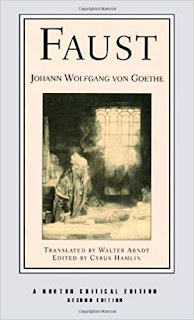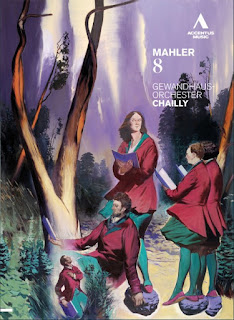Showing posts with label Glyndebourne. Robin Ticciati. Show all posts
Showing posts with label Glyndebourne. Robin Ticciati. Show all posts
Wednesday, 26 June 2019
Faust damned and saved
In the 1840s, Berlioz took the decision that Faust's ride with Mephistopheles, briefly featured in Goethe and pictured below by Delacroix, should end up not at the prison with the condemned Marguerite but in Pandemonium.
When he completed his original Huit Scènes de Faust in 1828 (his official Op. 1, preceding the Symphonie fantastique), Berlioz knew only of Goethe's Part One, where Marguerite is saved and a big question mark hangs over the protagonist's soul. By the time of La Damnation de Faust, he could have read the vast and astonishing Part Two, nominally completed two months before Goethe's death in March 1832 (what a span - first drafts begun 60 years earlier, in 1772), but chose to ignore its conclusions. There's much more striving towards the light here, not least the 'Classical Walpurgis Night' which culminates in the sea processional for Galatea on Venus/Aphrodite's shell, inspired by Raphael's gorgeous fresco in Rome's Palazzo Farnesina, which Goethe knew well (it's certainly on my list of top 10 things you have to see in the Eternal City),
and also the failed flight, Icarus-like, of Faust's son with Helen of Troy, Euphorion - the source for this creature of light here seems to have been Annibale Carracci's The Genius of Fame.
I've now spent six Mondays on La Damnation with my Opera in Depth students, and while our circlings round Berlioz have yielded plenty of other musical riches - so pleased to discover the Abbado recording of Schumann's Faust-Szenen, for instance, with a young and burnished Bryn Terfel following in the footsteps of Fischer-Dieskau on the patchily-cast Britten recording - as well as the revelation of Gustaf Gründgens, Klaus Mann's and István Szabó's model for Mephisto, in a colour Hamburg film of Goethe's Part One, it's been the reading of the colossal Part Two which has taken me on a psychedelic journey, with plentiful focus in the 150 pages of 'interpretive notes' by Cyrus Hamlin to Walter Arndt's translation in the Norton Critical Edition.
No wonder the San Francisco bookship City Lights published a translation of Goethe called Tales for Transformation, a copy of which I picked up when we visited; it's all so trippy. But also underpinned by Goethe's scientific studies and his humour (I love northern devil Mephistopheles finding himself overwhelmed by the older monsters of the Grecian world in the 'Classical Walpurgis Night' act). In Act 5, Faust's enlisting of infernal help to reclaim land for a flashy modern kingdom by a pushed-back sea, and having simple inhabitants of an older way of life dispatched for getting in the way, is so disturbingly contemporary.
After this you wonder why his soul is saved. But praise be for Goethe's final 'Mountain Gorges' scene in which the Eternal Feminine leads the immortal part of Faust upwards, completed very late in Goethe's life: it's given us apotheoses from Schumann and Mahler greater far than Berlioz's sugary acceptance of Marguerite into heaven. I played the last 15 minutes of Mahler's Eighth in Chailly's Leipzig DVD on Monday, and we nearly blew the roof off Pushkin House. A treat in splendid sound and on a large screen (Chailly's Lucerne performance is to be avoided. What a shame Abbado never got round to the Eighth in his unsurpassable series there. Why any conductors dare to follow in his footsteps with the Festival Orchestra beats me).
Take your pick of other performances on YouTube, but be warned - the Haitink one from the Concertgebouw has some uncharacteristically filthy singing from Gwyneth Jones at the crucial final rise... If it's just audio you want, I'm very fond of Markus Stenz's Cologne interpretation with the best tenor in that impossible part, Brandon Jovanovich, and the splendid Orla Boylan as Soprano II (she should have been on the very top line). The whole thing levitated me at the live performance.
I can understand why Richard Jones wanted to avoid Berlioz's apotheosis in his Glyndebourne production. Robin Ticciati said he couldn't, so they found another incredible solution in which the devils have the last word (first of Richard Hubert Smith's production photos above) and Rosemary's Baby is the last reference. What an amazing achievement. Whether you buy it or not is beside the point; Jones has found a way to tell the Faust story in all those chunks of Berlioz which have only the most tangential bearing on the drama (Rakoczy March, in which he's bullied as a tutor in a military academy, and further narratives in all the later military padding).
It's sustained through a creepy Blue Angelish brothel scene for the enchantment on the banks of the Elbe, an unexpected visit to the prison where Marguerite awaits exection, and which Faust doesn't reach in the 'Ride to the Abyss'
and beyond to his bleeding guilt, a disturbing realisation of said Apotheosis in Heaven.
In Christopher Purves - magnificent in the French adaptations of Goethe punctuating the musical 'action' as in the singing of Berlioz's music -
Allan Clayton (a stunning 'Nature immense') and Julie Boulianne, meaningful in every physical gesture as well as vocal phrase, a perfect performer for Jones, we have three great artists.
And the sounds Ticciati draws from the LPO are super-refined, though I wished at the final rehearsal they'd let rip. RT's assistant in the house said it was deafening at times; well, let it be, at key points. Possibly it now is.
Richard came to talk to the students the Monday before last, hotfoot from the final rehearsal of his Boris Godunov in the Royal Opera revival. He was in a good mood, both because of that - his admiration of Bryn is boundless; he singles him out as one of the few megastars prepared to work with directors, on the language and on general understanding of the roles - and his return to Glyndebourne to see the previous Saturday's performance of Damnation. He said it was 'middle', which apparently is the highest commendation; all the singers had settled into their roles, everything was working. And from that most self-critical of directors, that's high commendation indeed. No-one took pictures this time - pity, because the blue light from the projector cast on his head made him look like one of his own demons - so I cast back to the second of his visits to the class in 2013, when I had a room at the City Lit with a piano.
We expanded upon what we'd discussed in the interview for the Glyndebourne programme, conducted some months before rehearsals had begun, namely the difference between operas which work under the steam of their own dramaturgy - Katya Kabanova, his Royal Opera production of which had so much visually in common with Damnation, Puccini's La bohème and La fanciulla del West - and those for which he had to work out a new 'book' (Handel, the Berlioz). Which takes him years. When I asked him if he would take on the entire Goethe drama, he said he didn't have the time to come to grips with such a vast cosmology: respect. And I love it that he's ever more relaxed with us, and as a result extremely funny. Love that Mensch. Meanwhile, we're on to Dvořák's Rusalka next Monday, and next term, so far confirmed, Handel's Agrippina, Gluck's Orfeo ed Euridice, Weill's Der Silbersee, Wagner's Siegfried and Strauss's Elektra, with one more tbc. If you're interested in joining, leave me a message with your email - I won't publish it but I promise to reply
Subscribe to:
Posts (Atom)
















